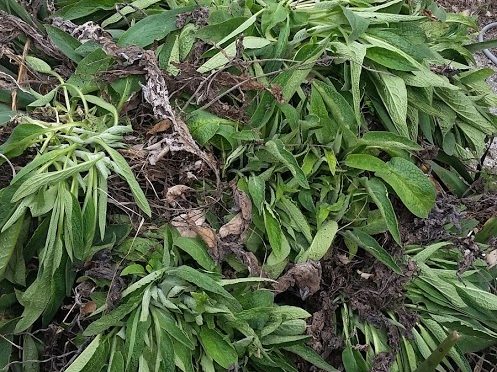Herb blurb is more than just herbs. It is all about the plants that can be useful and the ones to watch out for. Some of these plants may be trees, bushes, or vines. The plants may be eaten, some are medicinal, some are for fiber dyeing, some useful for animals, and some are invasive or toxic and you should watch out for them. Much of the information is gathered from various sources, and combined to one description, and added our experience with the plant. Meaning, we may have not written all the material. We will link references when appropriate.
Below is an alphabetical list of plants we have on the farm growing wild, cultivate, or have/do use for various applications. Click on the links to jump to that page. If there is no link to that particular plant, it means we have it on our list but haven’t written about it yet.
A
Alfalfa
Aloe
Asian Honeysuckle
Asparagus (Wild)
B
Bergamot aka Bee Balm
Black Locust
Black Walnut
Bloodroot
C
Calendula
Catnip
Cattail
Chickerory
Chives
Chocolate mint (See Mint)
Clover (Red)
Comfrey
Coneflower (See Echinacea)
D
Dandelion
E
Echinacea (Coneflower)
Evening Primrose
F
Feverfew
Foxglove
G
Garlic
Ginger (Wild)
Ginseng
Goldenrod
Grape (Cultivates)
Grape (Wild)
H
Honey Locust
Hops
Horsetail
Hosta
I
Indego
J
Jewelweed
K
L
Lemon Balm
Lemon Grass
M
Maple Tree
Mint
Mulberry
Mullin
N
Nettle
O
Oak
Onion (Wild)
Osage Orange Tree
P
Parsley
Peppermint (see mint)
Periwinkle
Q
R
Raspberry
Redbud
Rose (Cultivated)
Rose (Wild)
S
Sassafras Free
Spearmint (See mint)
Stevia
Stinging Nettle (See Nettle)
Sumac Tree
Sycamore Tree
T
Tansey
Tumeric
U
V
Valerian
W
Watercress
Willow
Winter Creeper
Wormwood
X
Y
Yarrow
Yucca
Z
